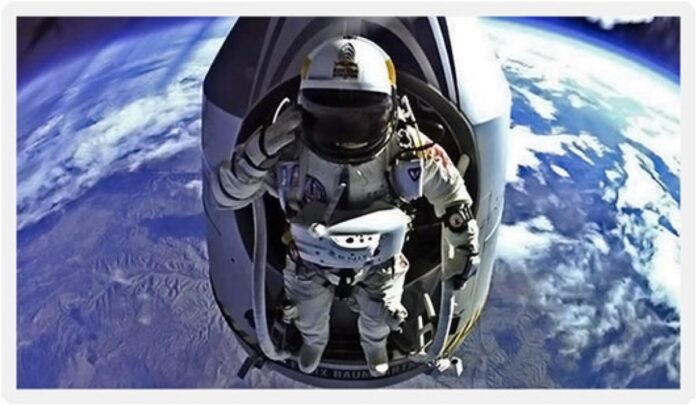In the 11 years since Sage Cheshire Aerospace Inc. built the capsule used in Felix Baumgartner’s record-breaking freefall jump from a high-altitude balloon, the company has been busy with some crazy things, said Chief Executive Art Thompson.
One of those projects was also balloon related.
The Lancaster-based company made the cluster of balloons used in September 2020 by magician David Blaine to carry him to 24,900 feet over Page, Arizona. Having reached that lofty altitude, Blaine cut himself loose from the balloons and floated to earth with the aid of a parachute.
Blaine had previously buried himself alive and froze himself in a block of ice, Thompson said.
“I guess the intention was to do something more uplifting – pun intended – than burying yourself underground,” he added.
Baumgartner’s jump, which took place on Oct. 14, 2012, was sponsored by the Austrian energy drink maker Red Bull GbmH. It broke a 52-year record for highest freefall by a human and put him at a top speed of Mach 1.24 – faster than the speed of sound.
But two years later, Alan Eustace broke Baumgartner’s record by dropping from a balloon floating at around 135,889 feet above sea level. His descent to Earth lasted 4 minutes and 27 seconds and stretched nearly 26 miles with peak speeds exceeding 822 miles per hour, or just over Mach 1.
Eustace, whom Thompson considers a friend, used data and technology from the Red Bull Stratos project of Baumgartner’s in his jump, he said.
After completing the Stratos project, the Antelope Valley aerospace company conducted internships with a number of university students on the science of liquid-fueled rockets, Thompson said.
“There is a definite need in the industry for people getting practical experience,” he added.
In the meantime, the company picked up some technology to be used to build a rocket plane, he continued.
“That is something we have been toying with and playing with,” Thompson said.
One of the best things about the rocket plane, named RocJet, Thompson explained, was that it’s built on previous technology that will allow the aircraft to take off from a conventional runway and launch a 600-pound satellite.
That is just about the weight of the satellites that SpaceX launches for its Starlink satellite constellation used for internet connections, he said.
So, if SpaceX needs to replace a satellite damaged by, say, a sun flare, or that was shot down by a hostile agent, it could currently take weeks or months to replace it, he added.
“Whereas with (the rocket plane) you would be able to literally next day to take off from a small conventional runway and replace a 600-pound satellite up to four times a day,” Thompson said.
Sage Cheshire is also working on some non-aerospace projects as well.
The company is collaborating with Eustace’s company Aqua Satellite on a zero-pressure submarine, which would be capable of going to the deepest parts of the oceans on mapping missions or to look for the wreckage of airplanes or ships, Thompson said.
It is also working on developing an underwater aqueduct that would carry water from the Columbia River to Southern California.
“We can bring 9 billion gallons of water a day to California,” Thompson said. “The advantage of this design is that we would provide 100% of what Los Angeles needs and 60% of what San Diego needs. It would also provide water to the central Valley, which would solve a lot of problems they are having with the farmers.”
